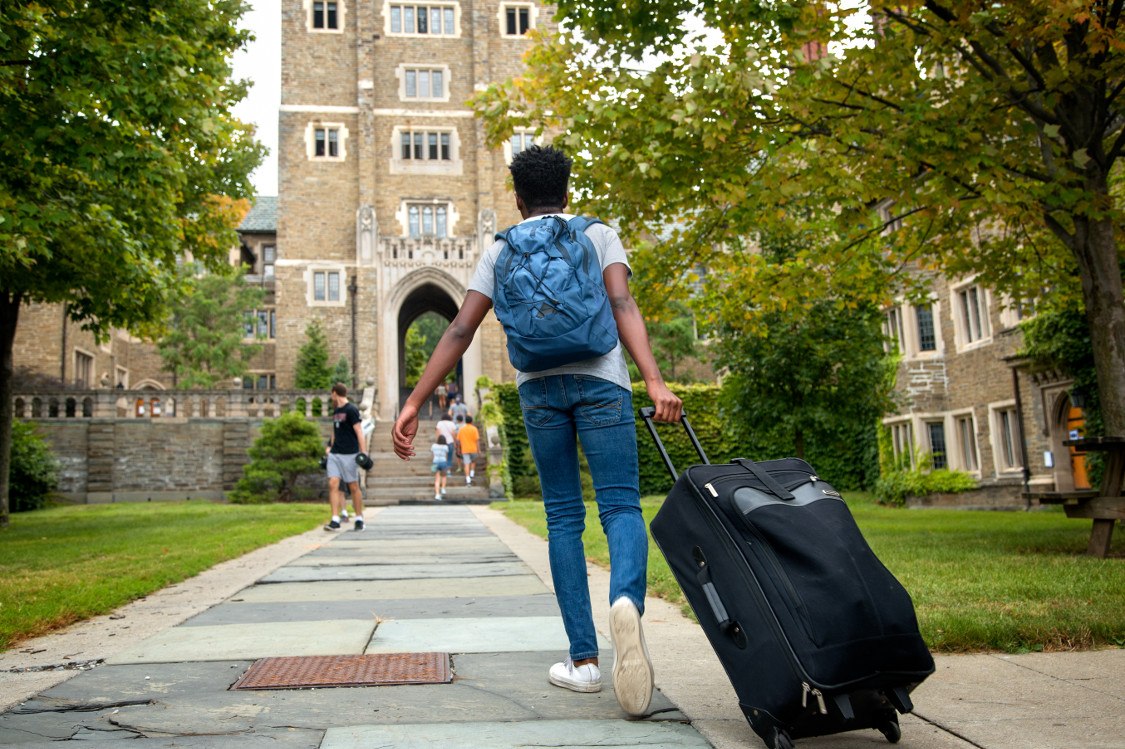One thing a majority of Americans agree on is that 2020 has been a challenging year. According to the American Psychological Association’s “Stress in America” survey, 72% of Americans think that 2020 has hit a new low point in our nation’s history.
More than two-thirds of Americans agree that the 2020 election has been a significant stressor in their lives. This holds true across party lines—with 76% of Democrats, 67% of Republicans, and 64% of Independents reporting that the U.S. presidential election is stressing them out.
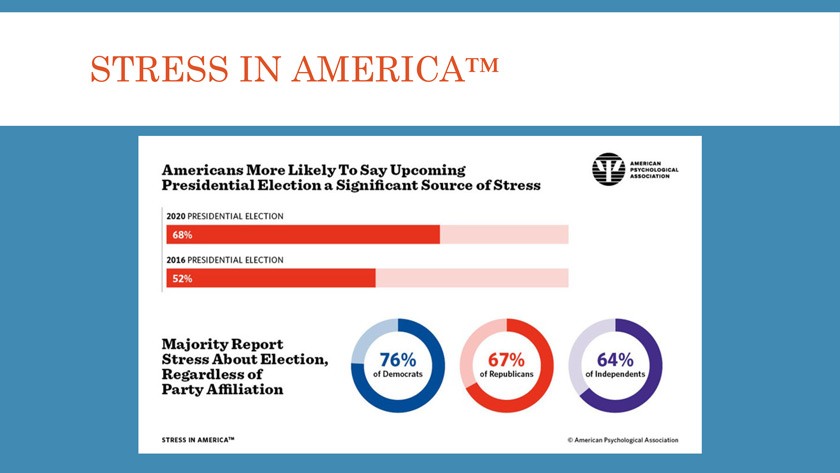
On October 7, Cornell President Martha E. Pollack reached out to the community to encourage every Cornellian to vote. “Reports have shown that only a fraction of those who register actually vote – this is especially true on college campuses,” she wrote. “Decisions made during this, or any, election create long-lasting policy impacts at the local, state and national levels. If you are unsure about the issues or candidates, take time to do your own research, engage in conversations with friends and colleagues or join any number of virtual events scheduled throughout October.”
Across campus, thought leaders worked proactively throughout the fall to launch programs and resources to help members of the Cornell community register to vote and educate themselves about various issues. The Institute of Politics and Global Affairs and the Mario Einaudi Center for International Studies hosted a series of virtual events featuring faculty, policymakers, and bipartisan experts, who discussed issues ranging from education to the postal service to the future of our democracy. Cornell also sponsored workshops focused on helping community members cope with a contentious election season and, when possible, use this election as a learning opportunity to create conversations across difference.
We value diversity and inclusion
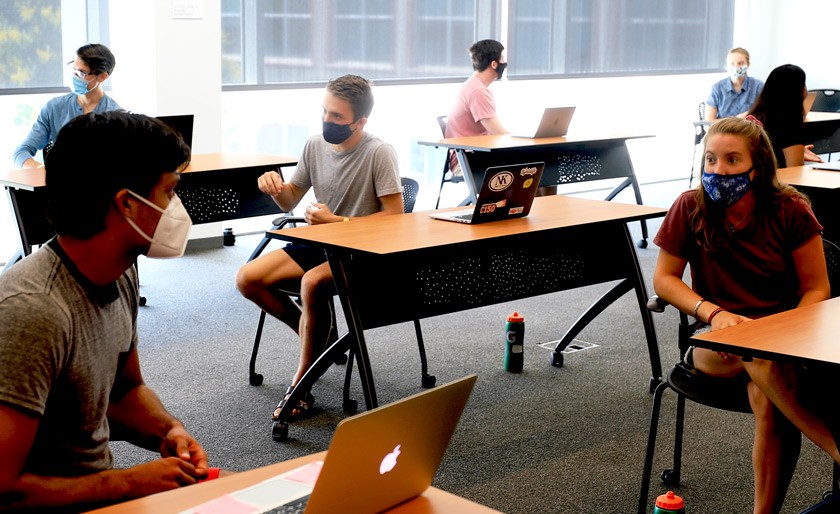
One of Cornell University’s core values is to create a community of belonging, “where students, faculty, and staff with different backgrounds, perspectives, abilities, and experiences can learn, innovate, and work in an environment of respect, and feel empowered to engage in any community conversation.”
The Belonging at Cornell initiative, launched just over a year ago, aims to create a campus climate that values the unique perspectives of each of its members. This is an ambitious, university-wide effort, and each college and unit is responsible for making measurable progress this year, and in the years to come.
The Intergroup Dialogue Project (IDP) is a key player in the effort to foster and maintain a community of belonging at Cornell. This fall, IDP created a special resource for talking about the election. The introduction to the 2020 IDP Election Guide acknowledges that “the results of this election will reverberate in different ways across our country’s diverse populations.”
The guide is intended to help faculty and staff facilitate conversations about the issues in ways that respect Cornell’s own diverse population. Cornell’s 24,000+ students and 10,000+ employees come from different places and backgrounds and have a range of views on health care, free speech, climate change, gun control, immigration, LGBTQ+ rights, and other timely issues.
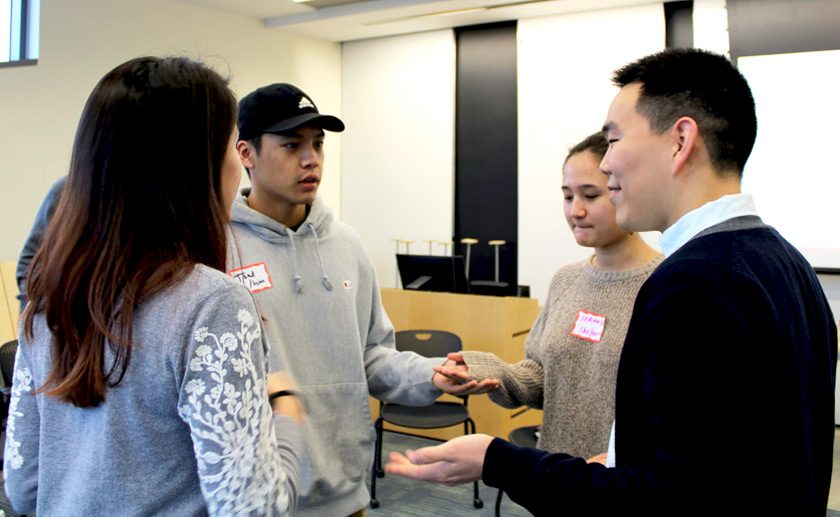
Stephen Kim PhD ’20, curriculum specialist at IDP and a member of the team that wrote the guide, shared that his own experience teaching at Cornell inspired him to create this resource.
“In my first year of teaching, the grand jury in St. Louis County decided not to indict Darren Wilson for the shooting of Mike Brown,” Stephen said. “I remember feeling so ill-equipped to talk about these national events with my students, but also feeling a huge sense of responsibility to acknowledge the events and engage students in conversation about them. In some ways, I helped write this guide to prevent other instructors from being in the same position as I was then—unequipped and unprepared to guide a room full of students who were looking to their teachers and mentors to acknowledge and process a nation-rending event.”
Through his work with IDP, Stephen has seen that national events can have a huge impact on students, and that it’s important to allow students to reflect on and deepen their understanding of these events. Stephen believes that he has a responsibility as an educator to handle these conversations with empathy and foresight. “These moments remind me that I’m more than a purveyor of content or skills,” he said. “I am someone who is modeling a way of thinking, feeling, and being in the world for my students.”
We can have important conversations
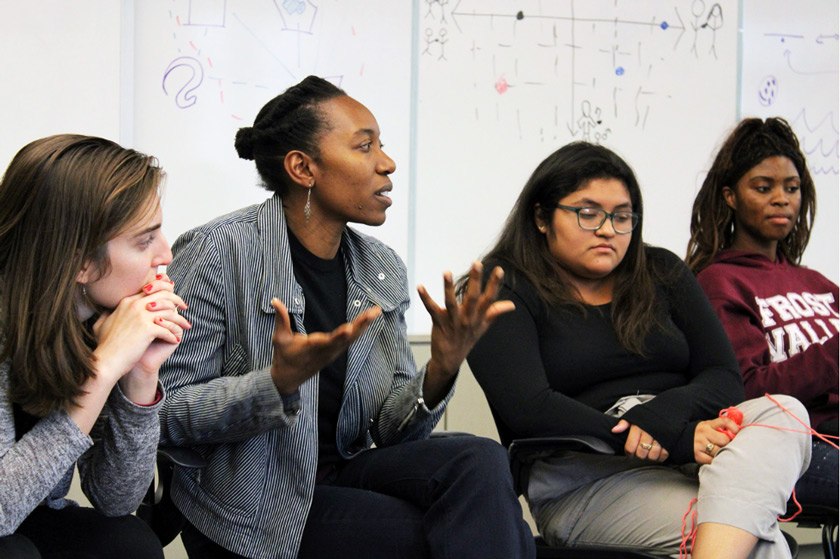
In their work across campus, Stephen and his IDP colleagues heard Cornell faculty and staff members express a desire to engage in conversations with their students and colleagues about the election. Yet, they also heard concerns about the challenges that come with having these potentially divisive conversations.
To respond to this need, the IDP team drafted their election guide. “We wanted to create an accessible guide that could empower faculty and staff members to hold conversations about important issues,” said Jazlin Gomez Garner ’16, MPA ’18, IDP pedagogy specialist.
Jazlin shared these tips for people who are nervous about having conversations about the election (or other controversial topics) with their friends and family: challenge the idea, not the person; use ‘I’ statements; and accept that things may remain unresolved. “I remind myself of these before entering a conversation,” Jazlin said “and they help me to be more empathetic and authentic in the way I engage.”
Over the past several weeks, IDP team members have shared the guide with interested faculty, graduate student instructors, and student advising staff.
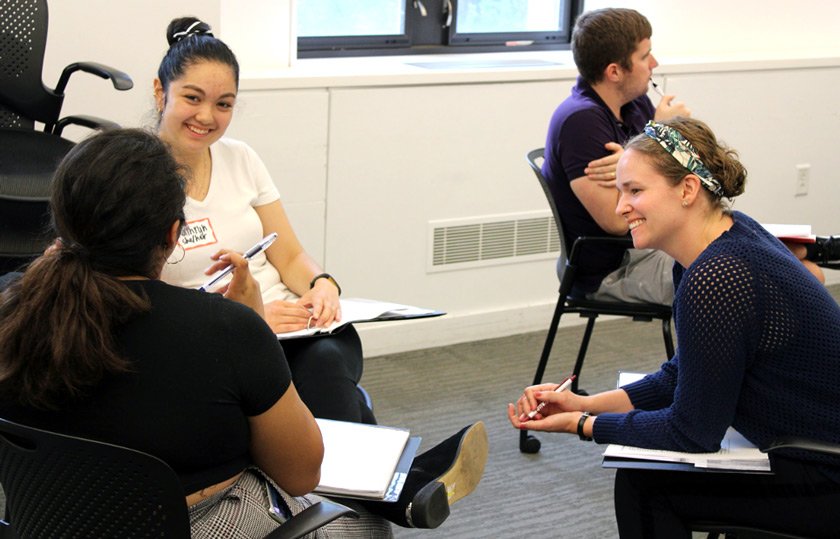
According to Jazlin, the feedback thus far has been very positive. Users have been especially grateful for the self-evaluation and assessment section of the guide, which has “prompted a great deal of personal growth and reflection,” she shared.
Jazlin thinks that the guide will be useful after the election, especially if it is contested. “I imagine that post-election day, the temptation to disconnect from people we disagree with, to detach and distance ourselves from the ‘other’ will be great,” she explained. “This makes our work more challenging, but also more important.”
Stephen agrees the guide and its content will remain relevant well beyond the election: “To acknowledge that an event is happening, to open up space to talk about emotions and personal impact, and to acknowledge that the impacts of the event are felt differently by different people,” he said.
Learn more about the Cornell alumni at the heart of IDP.
We don’t all feel the same way
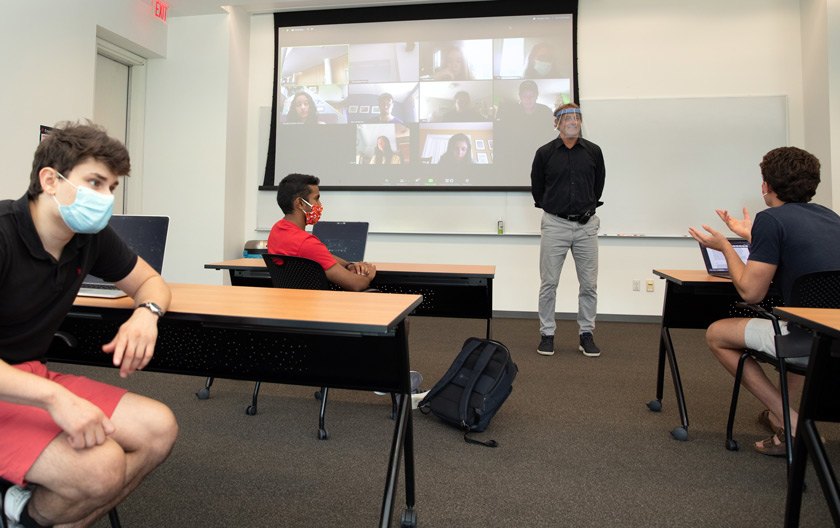
The Cornell Center for Teaching Innovation (CTI) has also been working to support the Cornell community and has posted explicit strategies for teaching about the election on its website. Teaching During the U.S. Election suggests ways to engage with students during the 2020 election season.
“Many of our staff remember the strong emotional reactions that happened among many students, faculty, and staff after the previous election,” said Kim Kenyon, associate director of CTI, “and we wanted to prepare resources ahead of time.” The guide suggests election-related teaching activities and provides guidance for supporting students during and after the election.
The goal of these activities is to foster inclusive classrooms, in which individual students feel they are included, acknowledged, appreciated, respected, cared for, involved, and that their identities matter.
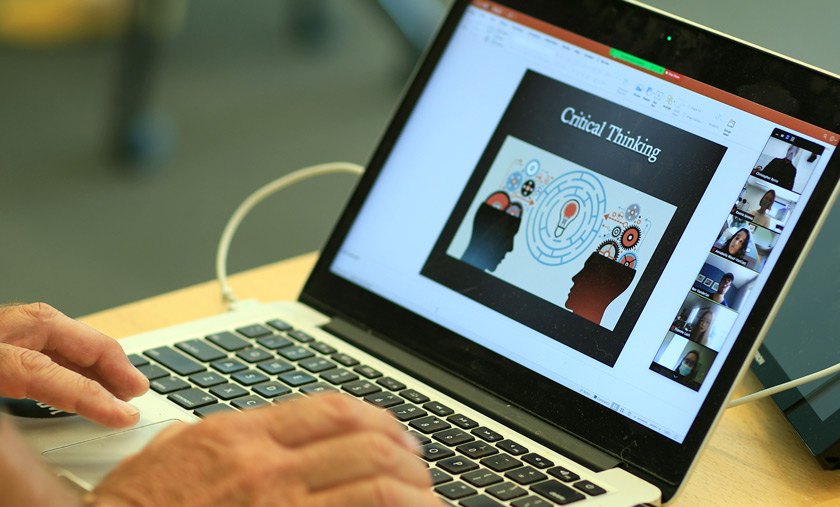
Kim cited a 2012 study that shows that cultivating a student’s sense of belonging positively impacts their overall success in college—by increasing their engagement and persistence, course grades, academic motivation, and emotional wellbeing. According to this research, “college students who feel that they belong in your classroom, and university, are more likely to succeed,” Kim said.
Carolyn Aslan ’94, associate director of the Active Learning Initiative at CTI, said that Cornell students consistently report they really appreciate when their instructors acknowledge the influence of current events on the classroom climate. In the past, CTI has provided resources to help Cornell faculty talk about controversial topics and respond to local, national, or world events. The CTI election guide is intended to help faculty “who may or may not feel comfortable with facilitating a conversation about the election” with effective ways to engage their students, Carolyn explained.
“CTI often works with faculty on strategies for setting expectations for discussion around difficult topics,” Carolyn said. “Setting out or reminding students of expectations for class discussions is an important initial step in creating a safe atmosphere for talking about difficult issues. Knowing they have a safe space can help students open up and process the ways they are experiencing the events,” she added.
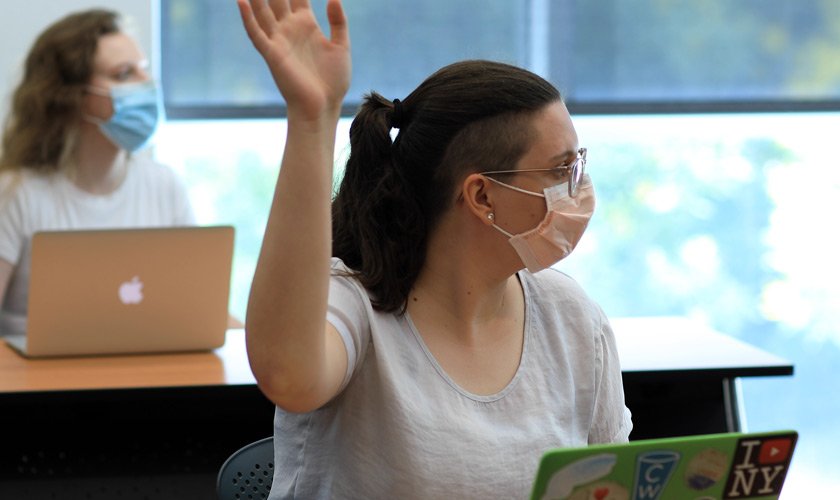
“CTI has helped me to become more self-reflective and open-minded toward differences,” said Professor Y. Connie Yuan. This semester, Connie has asked her students to consider how their own identities influence their political beliefs, what an election means for a democracy, and how our country should move forward together after the election. “People with different identities are equally entitled to whatever view they may have,” she said.
The CTI guide includes some post-election strategies for faculty, to help Cornell students process their feelings about the outcome. They include setting aside some time for students to do some private reflection and writing. Carolyn suggested writing prompts like, What are you feeling? What are your hopes? What are some actions you can take?
“It is important to recognize that students will have a range of reactions and will be affected in different ways,” Carolyn said. “Not all students wish to talk about the election, while others may need a safe space to engage with their emotions and thoughts around the situation.”
We can only go through it
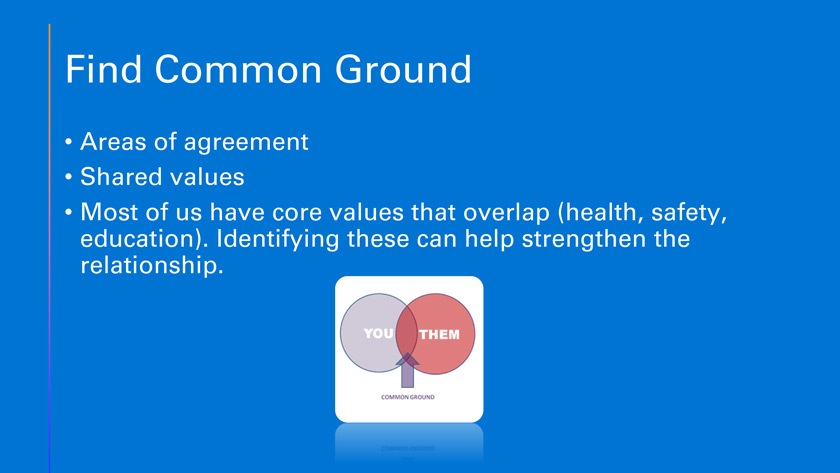 To support Cornell’s workforce in this highly contentious election season, Director of Workplace Wellbeing Michelle Artibee asked the Faculty and Staff Assistance Program (FSAP) to share wisdom and clinical expertise. Casey Benson, a counselor at FSAP, agreed to facilitate a special session to help Cornell employees cope with election anxiety.
To support Cornell’s workforce in this highly contentious election season, Director of Workplace Wellbeing Michelle Artibee asked the Faculty and Staff Assistance Program (FSAP) to share wisdom and clinical expertise. Casey Benson, a counselor at FSAP, agreed to facilitate a special session to help Cornell employees cope with election anxiety.
“The election is weighing heavily on the minds of employees and is compounded by other factors,” Michelle said. “Clinicians such as Casey are hearing directly from employees about the way these issues are impacting them and have the skillset to guide employees,” she explained.
About 100 people registered for the October 23 workshop, “For Our Current Times: Navigating Election Anxiety,” and audience members included Cornell faculty, staff, students, and retirees.
Casey acknowledged that there is much at stake, and that many Americans are feeling fear, anger, and grief as they think about the issues that face our nation, including: the pandemic, racism, our economy, environment, healthcare, immigration, and many more.
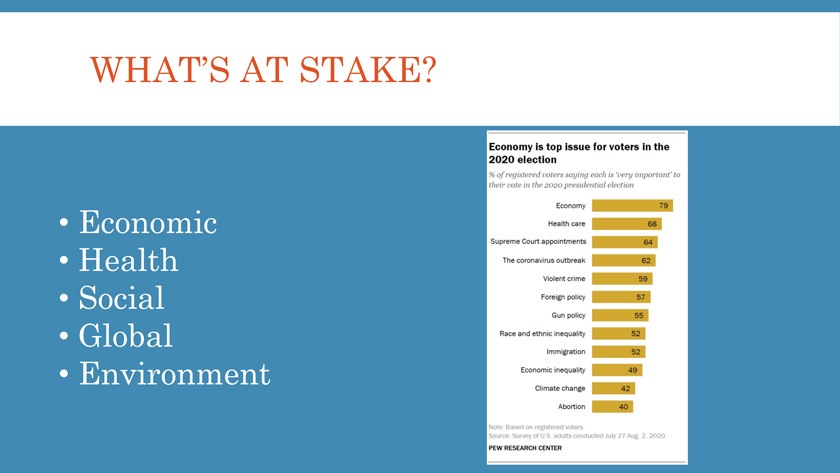
Casey said that facilitating this workshop was one way for her to manage her own election anxiety. “Can’t go over it, can’t go under it,” she said. “We can only go through it, and so let’s do it together.”
She started by asking participants to name and fully acknowledge the core emotion that was behind their election anxiety. Identifying the underlying emotion, including pinpointing where in their body the feeling is centered, is the first step in the process.
“The hope is that by staying with the feeling, we can move through it,” Casey said. “And in the end, maybe we can calm ourselves or become curious, maybe we find connection with others through experiencing this emotion, or maybe we offer ourselves and others more compassion as we explore this emotion,” she added.
Casey shared several evidence-based tools for coping with anxiety around the election, the pandemic, or other life stressors. Her tips share a common theme of focusing on what you can control, such as:
- limiting media consumption (especially before bedtime),
- focusing on the present moment (rather than ruminating on potential bad outcomes),
- using movement to take yourself out of your head and into connection with your body, and
- seeking out social connection.
“Research shows that if people are connected to at least one or two people, …they are more likely to cope better,” Casey said. “Having another mind to provide feedback, to normalize experiences, to validate, offer solutions… will help people cope. During this time of election anxiety, we need people more than ever.”
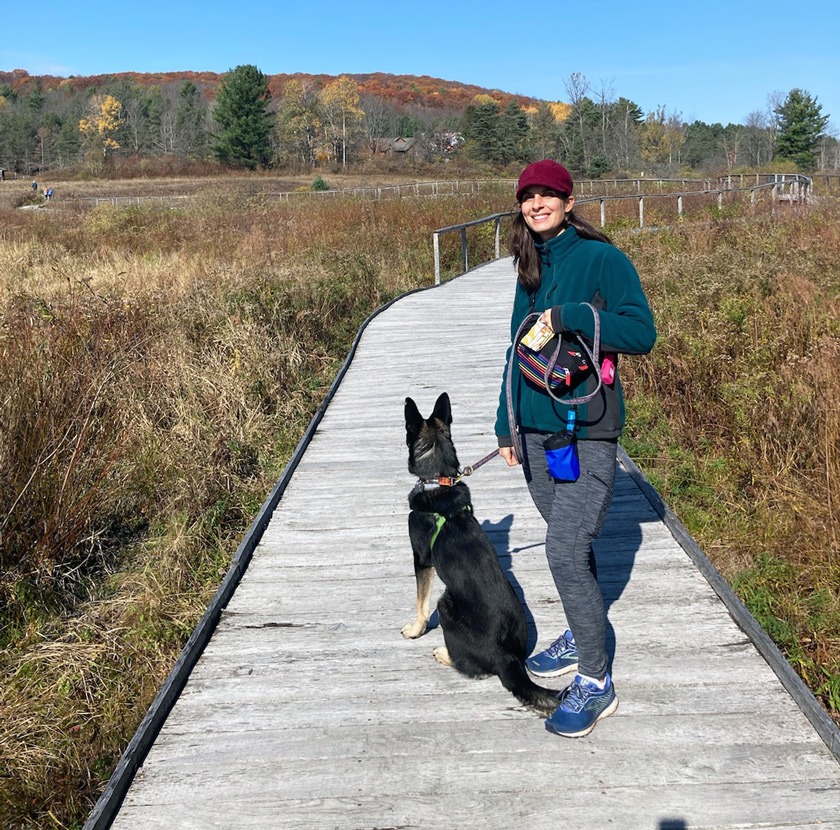
On election day, Casey said that she will practice many of these strategies herself. “I’ll probably check in with my loved ones and take it easy… I won’t listen to the news, just check in here and there, and go on with my day,” she said.
In the longer term, Casey reminded community members that “we can’t give up the hope that we can change things. Don’t give up and throw in the towel,” she said.
Casey asked participants who are experiencing election anxiety to consider shifting their attention from the national to the local level, where, she said, “real differences can be made.” She suggested that we consider volunteering, donating to a non-profit that we find meaningful, or becoming more politically active in our local communities.

